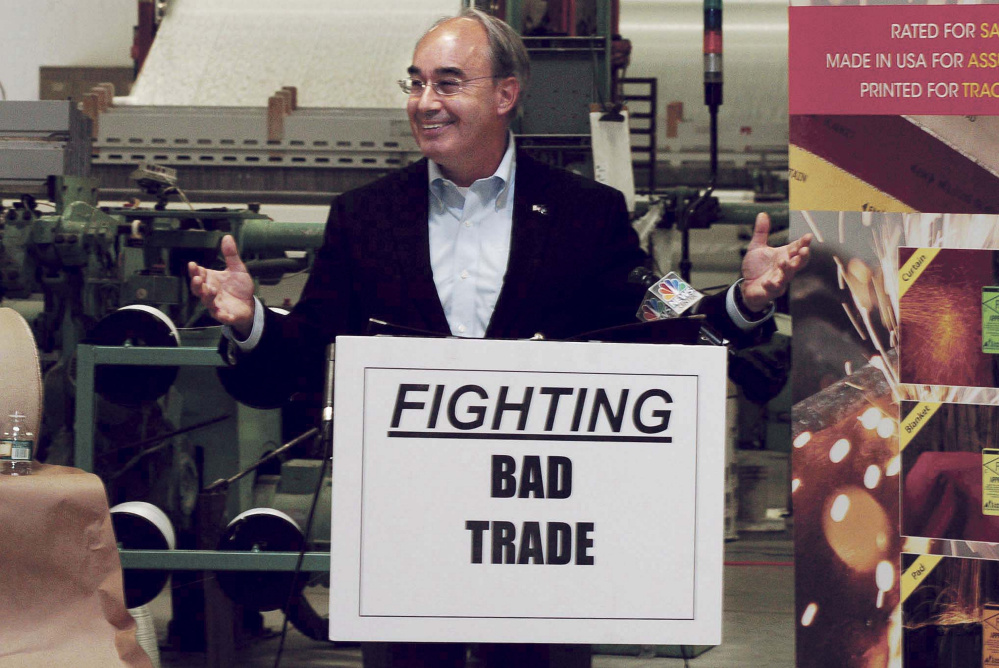AUBURN — In a win for a local textile manufacturer, the federal government has approved preliminary duties on imports of a Chinese specialty fabric that allegedly have been dumped into the U.S. market, undercutting American-made products at places such as Auburn Manufacturing.
The duties, approved by the U.S. Department of Commerce last week, will take effect on products that have been imported into the country going back to June at a rate of 162 percent of the declared value.
The ruling, which was announced Tuesday at a news conference at Auburn Manufacturing, echoes a similar decision by the Department of Commerce last November to place duties on paper being imported from Canada at the request of Madison Paper Industries. The paper company, like Auburn Manufacturing, argued that illegal subsidies by foreign governments were allowing those countries to sell competitor products in the U.S. for a fraction of the cost.
Madison Paper closed in May, putting more than 200 employees out of work.
“This is a really big win,” Kathie Leonard, president and CEO of Auburn Manufacturing, said Tuesday. “It shows just how many subsidies have been going to Chinese manufacturers from their government. It’s unbelievable.”
U.S. Rep. Bruce Poliquin, R-2nd District, who worked with the rest of Maine’s congressional delegation to help Auburn Manufacturing bring its case to the Department of Commerce, said at the news conference that the preliminary ruling helps “create a level playing field” for manufacturers.
“When you have a government — in this case, China — that illegally subsidizes their manufacturing such that they’re able to sell their product over here and dump their product here, it hurts Auburn Manufacturing and other companies,” Poliquin said. “The fact that these duties are so high shows you how much these Chinese companies and the Chinese government has violated international law.”
Dan Gleick, communications director for Emily Cain, who is running for Poliquin’s 2nd District seat, said in an email Monday that Cain supports the efforts by the Department of Commerce to level the playing field and challenged Poliquin’s assertion Monday that he has long opposed the Trans Pacific Partnership, a free trade agreement that would lower tariffs and other barriers to international trade.
“Poliquin was undecided on the job-killing TPP free trade deal until just recently,” Gleick said. “At the time that AMI was suffering from unfair Chinese trade practices, Congressman Poliquin was saying ‘free trade is good.’ We deserve a representative who was on the right side of this issue from the beginning, not one who shows up at the last minute to save his own skin.”
Auburn Manufacturing produces amorphous silica fabric, a fireproof material that is used in welding and other manufacturing, and employs about 40 people in Auburn and Mechanic Falls. Leonard said Tuesday that Chinese dumping has cost the company about 30 percent of its market share for the specialty fabric over the last three years and has caused them to cut back the company’s workforce by about 20 percent over the last year.
The company is scheduled to find out in January whether the duties will be permanent. If that happens, both Leonard and Poliquin said they have high hopes that market conditions will be more favorable to the company’s long-term success.
“We’re hoping to get our market back, and that will be enough,” Leonard said. “That means we’re on a level playing field, and that’s all we need at Auburn Manufacturing. That’s all we need in Maine and in the U.S., is a level playing field, and we can be competitive.”
While the situation is similar to that of Madison Paper, Poliquin said that though the company was successful in securing permanent duties on supercalendered paper imported from Canada, other factors such as high energy costs, punitive regulations and high taxes played a role in the mill closing.
He said it is critical that more business professionals get involved in making decisions about the factors that will allow them to compete.
“In the case of Madison Paper, it was too late,” Poliquin said. “In addition to that illegal trade, there were a combination of other things that hurt Madison. Still, we stopped that illegal trade dead in its tracks and we have confidence we’ll be able to do the same thing here.”
Rachel Ohm — 612-2368
Twitter: @rachel_ohm
Send questions/comments to the editors.




Success. Please wait for the page to reload. If the page does not reload within 5 seconds, please refresh the page.
Enter your email and password to access comments.
Hi, to comment on stories you must . This profile is in addition to your subscription and website login.
Already have a commenting profile? .
Invalid username/password.
Please check your email to confirm and complete your registration.
Only subscribers are eligible to post comments. Please subscribe or login first for digital access. Here’s why.
Use the form below to reset your password. When you've submitted your account email, we will send an email with a reset code.